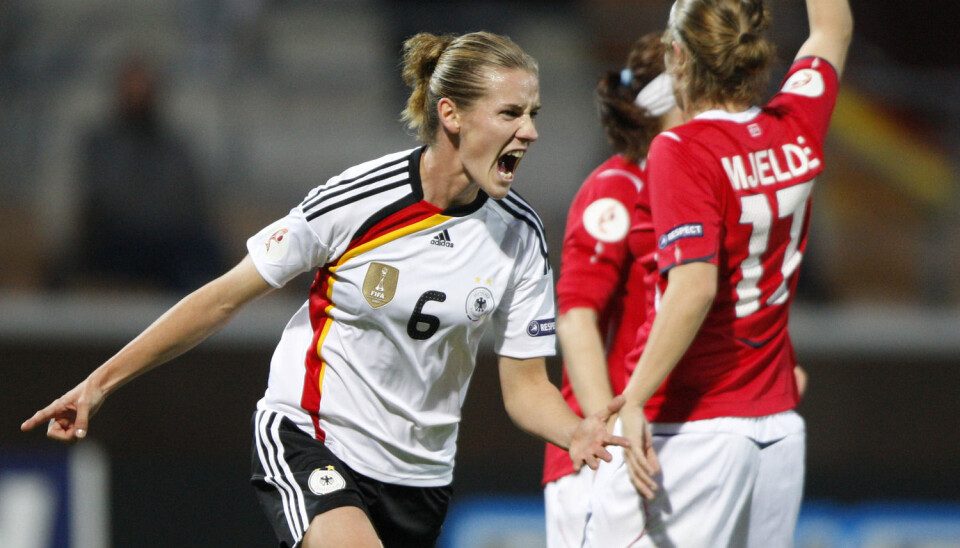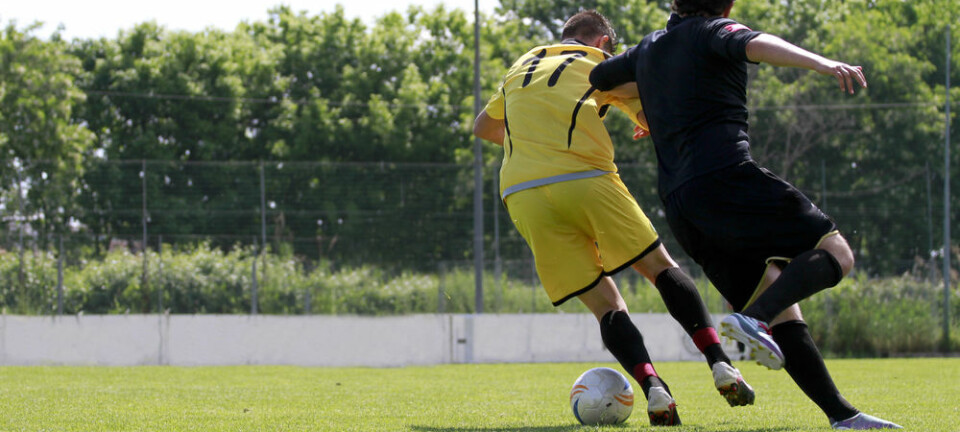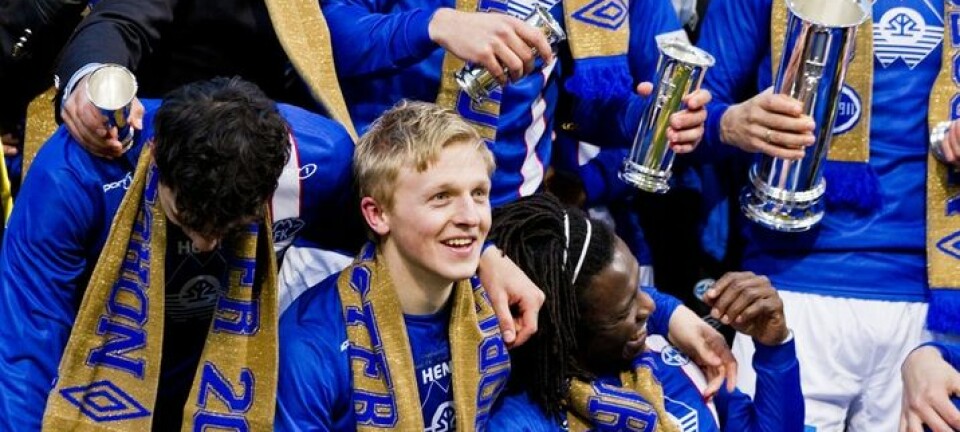An article from KILDEN Information and News About Gender Research in Norway

Why women's football isn't real football
The female body is not suited for real football, according to debaters in the online debate forum of Norway's biggest tabloid newspaper. Why is football the only sport in which women’s performance is constantly compared to men’s?
Denne artikkelen er over ti år gammel og kan inneholde utdatert informasjon.
“Female football players are always nagging about poor economy. Perhaps they should apply for funding from the disabled association. Women’s football = disabled sports.” (The quote is from VG’s debate forum from 2009)
There is no lack of intimidating and insulting descriptions of female football players and women’s football in the national tabloid VG’s online debate forum.
Female football players are described as slow, ridiculous, childish and physically weak. They are described as either ugly and lesbian or beautiful and sexy and thus worth watching. They know absolutely nothing about technique, they can’t kick the ball properly, and they have no football intelligence. They are so extremely poor players, it is too annoying to watch. A top women’s football team may be easily beaten by a 15 year-old boys’ team.
“You would never compare cross-country skiers Marit Bjørgen and Martin Johnsrud, and ridicule Bjørgen on those grounds. Neither do people compare women’s handball and men’s handball, although there are huge differences in the way they play. Men are faster and they throw harder,” says Professor of sports sociology at Norwegian University of Science and Technology (NTNU) Jorid Hovden.
But when it comes to football, men become the measure.
“Football differs from most other sports in Norway in this way. Normally popularity has to do with the sports results, but within football, gender decides the popularity,” says Hovden.
Contempt for women in online debate fora
In their article Negotiating the status of Women's Football in Norway, published in European Journal of Sport and Society, Hovden and sociologist Arve Hjelseth have analysed discussion threads concerning women’s football in VG’s online debate forum.
A total of 186 comments from three discussion threads form 2009 were selected and analysed. The background for many of these comments was the Football Association of Norway’s policy to promote women’s football. As a part of this policy, TV2 broadcasted from 2008 a number of women’s football matches from the professional league.
“There was so much contempt for women! I thought we had come much further,” says Hovden.
“Norway has been a leading country in the development of international women’s football, and the Football Association of Norway has taken measures in order to strengthen women’s football. I wasn’t aware of the great distance between the association’s policy discussions and the extreme opposition from some of the supporters who express themselves in the debate fora.”
According to Hjelseth and Hovden, the debaters represent people who perceive themselves as proper football supporters. Although it is not possible to know from the names, they believe that most of them are men. The discussion threads are open for all to read, and are thus publicly accessible written material.
The female body’s shortcomings
The dominating argument in the discussion threads is that women’s football is not proper football. The game is of low quality. The female body is not fit for the game. One debater’s suggestion is to let women play on smaller fields with smaller goals and a less heavy ball.
“In most sports men and women compete in different categories due to their different physiological conditions. You can’t compare their performances. But this doesn’t seem to apply for football,” says Hovden.
Women’s football is constantly compared to men’s football, but it never measures up.
“Women’s football is presented as something different, something gendered based on women’s physical shortcomings and lack of mental capacity – which can’t measure up to men’s. It is particular for football that women are so explicitly singled out.
Fear of the feminine
The debaters defend the discrimination of women’s football by referring to biological differences between the genders, strong men and weak women.
They use this as a reason for why it receives little financial funding despite the fact that it is the biggest sport for girls and women in Norway. They also use it as a reason for why it receives so little attention, despite the fact that the Norwegian women’s national team have won the European Championship, the World Championship, and the Olympic Championship. On the other hand, the men’s national team have never been particularly successful in international championships.
“Since the supporters use biology and gender as something essential in their arguments, they may say that it is only natural for men to be better at football. Men are physically and mentally stronger than women. With these arguments they defend social injustice,” says Hovden.
She and Hjelseth wonder whether the supporters fear that football will be “demasculinised”.
“Some researchers say that if you take football away from men, you also take their identity. Many men don’t like the fact that women are about to enter the arena and claim their rights. They want to have football to themselves. They are afraid of not being the only ones to define football.”
During the past years, a number of male football players have become sex symbols representing the metrosexual masculine trend, but according to Hovden, this does not threaten the masculine football identity.
“Only the very best make money on this. First, you have to be a top sportsman, then you may glamorise yourself. Heterosexual Beckham, who is married with children and who used to be one of the world’s top football players, he may do exactly as he wishes. He makes a ton of money showing his feminine sides without losing his status.”
The man as the measure
The discussion threads are not the only fora where women’s football is described as bad quality football. Even at a conference where Hovden presented her research, she was met by a researcher and supporter who claimed that women’s football is simply more boring to watch because the level is so low.
“Is there any truth to the claim that women’s football is of lower quality?”
“It depends what you mean by quality. Is men’s football high quality football? It depends on who and what decides the norms,” says Hovden.
“Marit Bjørgen skis very differently form Martin Johnsrud. But they are not compared. Why is women’s football constantly compared to men’s football? Perhaps there is a reluctance against letting women enter this masculine space and against giving them the power to define football.”
According to Hovden, women will never be considered good enough as long as men and men’s football is the norm.
“It is a sort of biological determinism where women and the female body are not regarded as part of the general and universal.”
In addition to this, the sport is pervaded by norms on heterosexuality.
“It is a lose – lose situation for the women. If you play football like a man you are described as a lesbian or as a third gender. If you are feminine, you are seen as good-looking and attractive to the male gaze, but unfit for the game.”
Unfair comparison
The most common objection from the debaters in the discussion threads who defended women’s football was that it is unfair to compare women’s football to men’s football.
“Of course women’s football is of lower quality – but why compare? People never compare women’s and men’s skills when they discuss other sports than football”, one person wrote.
Another asked the following: “Women deserve respect on their own grounds (…). What do we want to achieve with this discussion – to establish that football is just for boys/men?”
Comments like these often ended the discussion.
“We don’t know whether this was because the debaters couldn’t come up with any good arguments or because it was politically incorrect to argue against it,” says Hovden.
The footballisation
“Football is not the only male dominated sport still in existence. In Norway, ice hockey and many martial arts are dominated by men and traditional masculine ideals. On a global basis, rugby and American football are particularly male dominated. On the other hand, in the US football – which they call soccer – is regarded a women’s sport, whereas American football is for men,” says Hovden.
In a Norwegian context, however, men’s football is unique among sports. According to Hovden, it is the biggest, the richest, and the most powerful.
“Sports is a symbolic institution, it has enormous symbolic power in Norwegian society. Since sports performances are always expressed through gendered bodies, there is always a lot of talk about gender. Thus it has enormous gender political consequences when more than 90 per cent of the media’s football coverage deals with men’s football and men’s performance,” says the researcher.
According to her, society has undergone a “footballisation”.
“You may constantly occupy yourself with football. There are important matches on TV every day, all weekend, and the children have to be brought to and from football practice and tournaments.”
Moreover, men’s football is regarded as popular and public property. It is a sort of popular culture which is rooted in the working class, it is an everyman’s sport.
Women’s football in progress
Hovden and Hjelseth are not certain how easy it would be to change the opinions of the supporters in the discussion threads. The debater who wrote that women’s football belonged to the disabled sports received a lot of criticism, but new insulting comments flourished shortly after.
During the European Championship for women’s football in 2013, the Norwegian national team received a lot of attention from the media. They were both praised and criticised for their play in the finals, which made them silver medalists.
“There is progress,” says Hovden.
“In terms of percentage women’s football is growing more than men’s football. This means that the Football Association of Norway have to take it seriously. Things are happening, but this is mostly on the political arena. We have been looking at supporters at the grassroots, who don’t feel the need to be politically correct. And there we have a long way yet to go.”

































